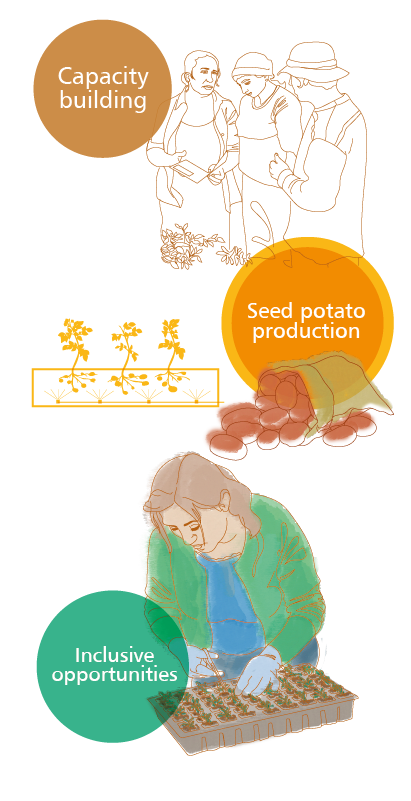To address this dilemma, the International Potato Center (CIP) has partnered with USAID, farmers, the private sector, the Georgian government and civil society organizations, to execute the Georgia Potato Program. This four-year initiative uses a gender-responsive, socially-inclusive approach to promote innovations and improved agronomic practices to expand Georgia’s potato sector – sustainably and profitably!
In less than two years, the program has helped more than 2,300 smallholders adopt innovative technologies and farming practices and reached more than 1,700 – about a third of them women – through online workshops. Almost half of the participants in 2021 were women, and most beneficiaries increased their yields by 225-263% by using quality seed potatoes and good practices, the program also facilitated the evaluation of three high-yielding, disease-resistant potatoes recommended for release as varieties that will further boost production.
While the Georgia Farmers’ Association (GFA) created a Potato Council to advance issues related to the crop, the Program helped farmers create a Potato Producers’ Network (PPN), which is becoming a cooperative. Though small, the PPN is growing, and, given that half its members are women, that growth will be more inclusive.
“Women play a significant role in potato production and need information about innovations and good practices as much as men do,” observes PPN member Nestan Vibliani. “As women become more involved in potato farming, their knowledge and experience are growing. This will allow them to earn better incomes, which means their families will become financially stronger,” she says.
Priming productivity
The principal cause of Georgia’s low harvests is that most farmers plant low-quality seed potatoes. Farmers in countries with high potato yields regularly purchase disease-free seed potatoes from specialized producers, but Georgia has never had a commercial seed potato sector. The country imported 600 tons of seed potatoes in 2021, but most farmers still plant locally-sourced, low-quality seed.
The Georgia Potato Program is working with agricultural businesses and smallholder farmers to catalyze quality seed production while aiding Georgia’s Science Research Center for Agriculture to develop an effective seed certification system. One groundbreaking achievement was the inauguration of a model seed farm in Akhaltsikhe, in southern Georgia, managed by the PPN and the private company Rural Advisory Service Ltd, with support from GFA and CIP. The farm is equipped with an in-vitro lab, two greenhouses, and 4.5 hectares of irrigated plots. The staff applies a mix of hydroponics, aeroponics and apical cuttings to produce disease-free foundation seed used to grow certified seed potatoes. The farm produced 22 tons of foundation seed in 2021, that its staff and 640 smallholder farmers – half of them women – used to grow commercial seed potatoes. The farm’s irrigated plots are expected to produce 150 tons of certified seed in 2022, with a market value of approximately USD 155,000.
To raise farmer awareness about the importance of quality seed, the Program coordinated 200 seed potato demonstration plots on small farms – 53 of them managed by women. Young farmers are also capitalizing on the opportunity. Twenty-five year old Giorgi Khitarishvili planted quality seed for the first time in 2021 and produced 33 tons per hectare – almost three times the national average yield!
Seeds of empowerment
Whereas the average size of Georgia’s male-headed farms is 1.3 ha, the average size of female-headed family farms is only 0.77 ha. To help women farmers overcome such disadvantages, the Potato Program helps a growing number of women to produce quality seed, which sells for higher prices than table potatoes.
In 2021, 11 women were trained in producing apical cuttings, used to grow disease-free seed potatoes. They became members of a Seed Potato Multiplier Unit, certified by the Science Research Center for Agriculture. Their goal is to produce two million rooted apical cuttings in 2022, which should be enough to provide 10,000 farmers with quality seed potatoes.
Khatuna Bolkvadze, a widowed mother of two young girls, explains that producing apical cuttings has provided her with needed income and alleviated the sorrow she felt since her husband passed away. “The moment I started working in the greenhouse, I felt a strong sense of responsibility, because I know I’m helping other farmers improve their production,” she explains.
Bolkvadze and hundreds of other women and men trained under the Program are helping build the foundation of a national potato seed sector with potential to transform the production and livelihoods of the Georgian farmers.
Funders: CGIAR Trust Fund donors; Republic of Austria; United States Agency for International Development.
Key partners: Georgia Farmers Association; Javakheti Agro Company Ltd; Marneuli Agro LLC; Rural Advisory Service Ltd; Science Research Center for Agriculture/ Ministry of Environmental Protection and Agriculture, Georgia.
Associated CGIAR Research Program: Roots Tubers and Bananas.


